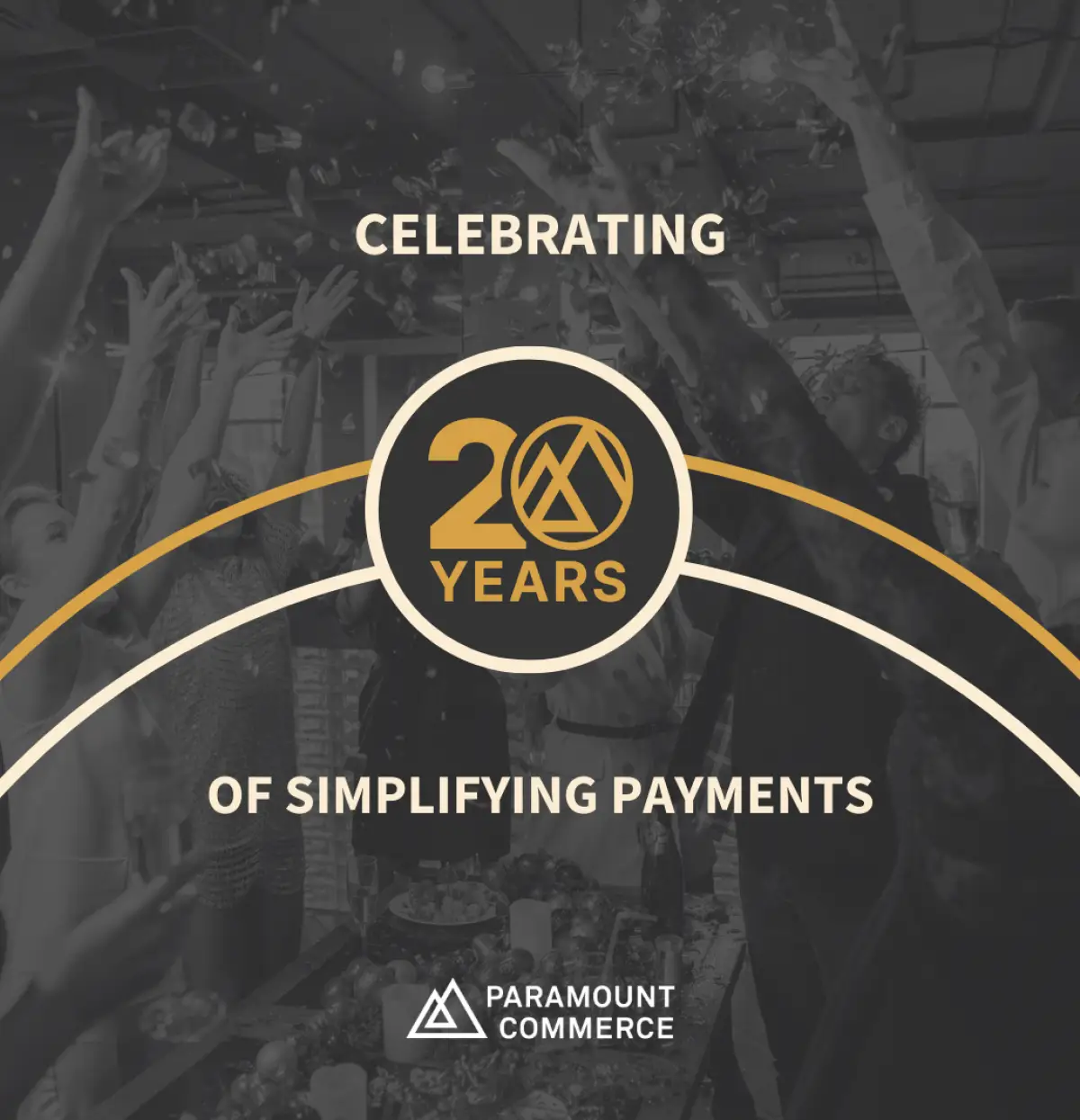The iGaming Show - EP 11 (The Paramount Commerce 20th Anniversary Podcast)





Welcome to the Paramount Commerce 20th anniversary podcast! In this episode, we'll be celebrating two decades of innovation, growth, and success with the company's leadership team. We'll be taking a deep dive into the company's history, its achievements, and its vision for the future.
Leaders in this episode:
Dave Roe, Chief Operating Officer
Sereena Boparai, Chief Revenue Officer
Akhil Mittal, VP of Product Management
Amy Reier, Director of Legal
The iGaming Show, presented by Paramount Commerce, is a podcast that will analyze gaming industry trends with experts from various gaming organizations.
Please like, comment, and share this video. Also, stay up to date with our content by subscribing to our YouTube channel.
Full episode transcript:
Varad Mehta: Hello everyone, and welcome to a special episode of The iGaming Show presented by Paramount Commerce. I'm your host, Varad Mehta, and today it is Paramount Commerce's 20th anniversary podcast. We are going to be celebrating two decades of innovation, growth and success with the company's leadership. We're going to take a closer look at the company's history and much more with Dave Roe, Chief Operating Officer at Paramount Commerce. Sereena Boparai, the Chief Revenue Officer at Paramount Commerce. Akhil Mittal, VP of Product Management at Paramount Commerce. And Amy Reier the director of Legal at Paramount Commerce. So, without further ado, let's get the show rolling. What is one thing you get in the UK that you just can't get anywhere else? Could be food.
Dave Roe: Good tea.
VM: Okay, that's hilarious.
DR: Actually, the tea that you make at home I think is probably hard to reproduce anywhere else you go.
VM: It's the type of tea.
DR: The type of tea and the milk that you use because we put milk in our tea. Maybe even down to the water, I don't know. But even if I take my own tea bag somewhere else, then it still doesn't taste the same.
VM: This is hilarious. I love that answer. If I'm not mistaken, someone from your family is an army medic.
Sereena Boparai: Oh, that would be my mum, yes.
VM: Could you tell us about that?
SB: Because that's really cool. Yeah, she's actually a nurse in the Royal Navy, so the Royal Navy Reserves. Yeah, she joined, I believe sometime around when I was ten or eleven years old. So she's been in the Navy for a very long time now. She is a nurse kind of outside the naval forces profession and so does the same thing for them. She's been deployed a number of times to Iraq and Afghan. She gets to do lots of interesting stuff. She's an incredible woman, a great person to look up to, and yeah, she's amazing.
VM: I read on your LinkedIn that you speak a little bit of Korean. Can you say something for us in Korean? And how did you learn Korean?
Akhil Mittal: Oh, wow, you did your research for sure. Yeah, I could say "annyeonghaseyo je ileum-eun Akhil ibnida" that means I'm introducing myself. My name is Akhil. How I learned it? I always had a love for languages. I've tried Spanish and French before too. And I myself, being from India, I had to learn different languages. So I knew three languages growing up. So Korean, just because some of my friends were from Korean, I was taking a trip to Korea in 2016, so I thought it'll be good to sort of know a little bit about the language. So I took a course at the Korean Consulate and then I got hooked and I just continued learning and spent a few years on that. So, yeah, I can speak a little bit, read, understand, can watch some Korean dramas and follow along.
VM: Okay, Amy, so if you were the lead singer of a band. Who would you like to have as your guitarist, bassist, and drummer?
Amy Reier: Oh, that's a toughie. Okay, so let's go with Zakk Wylde from Ozzy. Let's do with Geddy Lee from Rush on bass. And John Bonham from Zeppelin on drums. We're going to be a pretty heavy band, I think.
VM: Yes. Very good choices.
Q1. Looking back over the past 20 years, what are some of the defining moments for Paramount Commerce?
DR: Sure. So I think that for a company to be successful over a 20 year period, they need to achieve a lot. And I prefer to look at the defining kind of phases of the company. Not necessarily. You can talk about product launches and being ready for certain market changes and things like that but I like to look at the phases and I think starting with the beginning where the founders of Paramount really saw that gap in the market and almost straight away it probably felt like an age for them at the time. But in the grand scheme of things relatively quickly became successful in terms of processing volumes and being profitable very quickly and things like that. So that real beginning, of course, was absolutely critical, but it was certainly a defining phase.
SB: We work with all of the merchants, big and small, on all ends of the spectrum. We hear great feedback around our product. People have actually moved away from other suppliers to use ours. And so I think that's an incredible success story. It really reconfirms everything that we believe about our products, what we want to do in the payment space. And just really goes to show that the things that we're bringing to the market are what the market is looking for, that we're innovating on top of existing products and payment rails to really make sure we're bringing the best payment products to our Canadian customers. And so I would say that's, at least during my time at Paramount Commerce that's definitely a number one top kind of achievement for us.
AM: Yeah, I mean, 20 years is a pretty long time and rich history the company has. Right. So for me, since I joined the company because I didn't know enough about this industry in general, but as I sort of started working and learning about it, you've got to appreciate the dynamic nature of the gaming market that we were in and payment space specifically, which is even more niche within the gaming industry. When I took over the product function and the team, the team was small. And of course, growing that team was a big accomplishment for me. But also from a company perspective in our US business, we were the first to launch the real-time payments. Now, real-time payments, why it's such a big deal? Because it's been talked about such a long time, and being the first company being ready for that and taking advantage of that and actually providing a solution to your customers immediately, as soon as the technology is available, it speaks volumes of the accomplishments in general the company has over the years. But specifically, that was probably a defining moment for me.
AR: Oh, wow, there's so many with Paramount Commerce in the last 20 years, and I've only been here just over a year. So I think I want to focus on that because one of the biggest achievements has been within the last year, actually, and that's been on handling the (iGaming) regulated market, bringing in and onboarding new merchants and all of the changes. That was extremely well executed here. And I'd say that's one of our greatest achievements.
Q2. How has the company adapted to the changing landscape of digital payments?
DR: I think that first and foremost, the company must have the right culture. And the thing that really underpins our culture are our values. One of our values, for example, is Change Or Die, which is fundamental if you're going to be successful in a rapidly changing market. I think if we think about go back to what I was talking about, the different phases of the business, it's arguable that 5-10 years ago, a lot of what Paramount did was primarily its own technology. Everything, if you looked at it, was proprietary. And while there are advantages to that in terms of maintainability and even control of your own destiny to some degree, but it also can hold you back because you're completely dependent on what you can do yourself with your own resources. And through partnerships, sometimes strategic or integrating with the right tools and partners and suppliers, then you can start to increase your throughput of innovation because you're not reliant on yourselves to do everything. So I think that transition from a company that was 90-100 percent proprietary to a more balanced setup has been a significant factor in our ability to keep changing and being dynamic.
SR: I think that one of our core values as a business is Change Or Die. And so I think that it really underpins everything that we do, is to make sure that we're continuously changing and adapting to the industry. And what people are asking for, and ultimately understanding what people are asking for, comes from our relationships with our merchants and our customers. And so we really pride ourselves on the relationships that we build with our customers. We want to make sure that we're listening to their feedback and what they want from a payment provider and also really listening to the feedback they get from their own customers as well. So understanding what they want when they see a deposit method on a cashier, if they're looking for enhancements or improvements, making something easier to use or faster to use. Hence the launch of one-click payments for us with our InstantBank Transfer product. And so I think it's really all about listening to what the market wants, what our customers want, and being agile and changing as those need change over time, which inevitably they always do, and continuously do.
AM: When Paramount started 2003early 2000s, I think fintech wasn't as hot as it is right now in the last ten or so years. So being in this space that early, I can only imagine the amount of challenges you faced. And I understand several sort of legislations went through in the US side, even in the Canadian side, as a market, is only just opening up in Ontario since last year. So definitely all of these are challenges that most companies who are coming into any new market face. So it has a long history of sort of tackling these challenges and adapting to them. Recently, as I mentioned, 2022, then Ontario (iGaming) legislation happened. We were right there. We were prepared from before, and we kind of right when, April 4th, 2022. We were compliant and so were our merchants. So we kind of take advantage of whatever the situation provides us as an opportunity. And to your earlier point, as you mentioned, that I have to be on top of things. Yes, definitely product function is that, but I think we depend on all our counterparts. It's quite a bit of a team effort because we can't be at every place all the time, but we are sort of at the centre. We try to make sure we get all of the intel that we can from everywhere, ourselves, through our team members, through any of the other business partners that we have. So that's how we sort of move forward.
AR: I find that Paramount is an extreme leader in innovation, and I find that not only for products, but for services, they're always improving the experience for the merchant and for the end user ultimately. And I also see them embracing innovation within the company itself to help the entire team. That's been Paramount for me.
Q3. What challenges has the company faced over the years, and how has it overcome them?
DR: I think that the biggest challenge over probably the last five years has been the level of competition. Prior to that, there wasn't so much innovation actually outside of Paramount in the payment space. It was mainly the banks and, for example, card processors, acquirers, and so on. And I think that it's been a healthy environment for us to operate in. It's given us a renewed focus on what we needed to achieve as a business. And again, those foundations of what's your culture, what's your core purpose, which ours, is to simplify payments. That's not just to say that consumer paying to a merchant needs to be simple. It's the whole end to end offering that we have from how we work with our merchants,how merchants can start to accept payments through our solutions, how they manage their accounts with us. Also for our people, making it as simple as possible for our people to support our solutions, how they develop them, how we launch them, all of the end to end internal processes as well.
SR: I think a challenge probably is really just making sure that you're always innovating. I think it's so easy in payments to fall behind if you're not doing that. And we've definitely seen that happen many times over with other people that have provided payments in various verticals and in gaming as well. The payments rails are changing. What's available is always changing. We know that the real time rails are coming to Canada and that's an innovation that we will be spearheading for our customers and really making sure that we're first to market with that. And so I think that's the biggest thing really, is always trying to make sure that you're at the forefront of building the best products with the most efficient rails. And for us, innovation is number one in everything that we do. Another core value to keep dropping them in is solve for success. And I think that's something that, again, we're always doing when we're thinking about our future product roadmap and future development functionality releases, the fun stuff that we want to bring to our customers and make them excited about. It's really all about how we can innovate and what we can do that's different to what else is available.
AM: Yeah, I think one good thing is because we have always been in the space in general, so we had a very good understanding of how the products work. And also we were very early in the game try to make sure we understand legislation before it goes public. As in we try to make sure that we understand what's the motivation behind it, what will be our requirements, what's on the operators, et cetera. So we were prepped much before and then as we sort of do our roadmaps, we do our planning for the year. This is something at the top of the chart, so we know that this is something we need to do. And we made sure we had the tools for our merchants to go live with this before even the time sort of came on the April 4 date. So basically it's a matter of prioritizing and making sure when you're planning, you have the knowledge of why we're doing this and when it will be the right time so that we give enough time for our merchants to make sure they are compliant. So we have to be ready early on. So that's how we manage this.
AR: I think I've got to go back with the changing of the laws. The fintech industry is changing, the gaming industry is changing just rapidly in the last several years and it's really keeping up with those laws. We have a fairly new legal team here and some of us are newer to these industries. So it's really keeping up on those laws and constant changes there.
Q4. Looking to the future, what is the company's vision for the next 20 years?
DR: So, first of all, we don't look too far ahead because the market is extremely dynamic. We've been in the past sometimes challenged to have a 10, 15, 20 year plan. And if we look back at what's happened in the last 20 years, you look at yourself in your own world. What kind of new technologies have come around from the ear pods in my ears and the phones and the transportation and you name it. You look at everything that's going on in the world today and whatit was like 20 years ago. So much change. So we really stay focused on the short term, medium term to some degree. Of course, we do have longer term plans. Our key kind of three year objective is to be the biggest account to account payment provider in Canada across all industries that exist. And then at the same time, we look at, okay, how can we take our expertise, our technology, our know how, our reputation into other countries? So those are the main things. And of course, continuing to innovate, to push the needle, and all of those things have to come together in order for us to continue to be successful in the short, medium and long term.
SB: Yeah, absolutely. I think we kind of pride ourselves on the relationships that we've built with some of our vendors and suppliers. We want to make sure that we can bring new things to our customers. I think really our vision probably moving forwards is just to continue our company core purpose, which is simplifying payments. And outside of that, I think we're really excited to expand into new verticals. Our aim is to become the largest account based payment provider in Canada. And so that means expanding outside of gaming. So we're starting to really build up our relationships and launch with other verticals. And yeah, I think outside of that,it will be that we're really focused on being first to market with real time rails. It's the next big innovation that we're super focused on and really excited to bring to our customers. So, yeah, I covered a lot there, but those are the key things.
AM: And as we know that more markets that open up, Ontario is just one there's, Alberta, B.C., et cetera, they'll open up, so there'll be more things to do for each of those products. And from there, I think there's opportunity to look at the real time rails, which is imminent, hoping early next year. So we want to be ready for that. So we make sure that we arefirst to market there as well. And sort of open banking is another sort of area which is kind of aligned with the real time rails at the same time. It's happening at the same time, but it depends on the banks and how fast they move to open that up as they give access, we want to be there to have this access and offer that to our customers. So I think those are some of the things that we are actually focusing on from a product perspective, because the rate of innovation is pretty fast nowadays and speed is the only way to basically keep a competitive edge. So we want to make sure that we are sort of first in offering these innovative solutions to our merchants.
AR: I think it's going to be new, exciting products and new verticals for us. I also think that in terms, it's going to be other provinces are going to be regulated down the road as well, and they're going to be different changes and they're not going to be exactly like Ontario. They're all going to be unique. And so that's going to be exciting and it'll be interesting to see how we adapt to that and how seamless we can bring in new merchants and adjust to those changes. And the other areas that I'm really excited about seeing us move into is open banking in Canada and as an industry and just changing fintech laws on a global basis and a national basis. And if I was to give a bit of advice to anybody going into this field, I'd say be the expert, know your stuff and learn these areas inside and out. Just always watch those new changing developments.
VM: I want to thank Dave Roe, the Chief Operating Officer at Paramount Commerce. Sereena Boparai, the Chief Revenue Officer. Akhil Mittal, the VP of Product Management. And Amy Reier, the Director of Legal, for joining us today for this special podcast and providing their wonderful insights into Paramount Commerce and its story. If you enjoyed today's episode, then please don't forget to like, share and subscribe to our YouTube channel. If you have any questions for us or the leadership team, then please do comment them down below. I'm your host, Varad Mehta. Happy 20th birthday to Paramount Commerce. And until next time, keep gaming.
Fintech trends and insights,
explained in 5 minutes or less

Fintech trends and insights,
explained in 5 minutes or less
